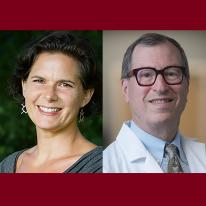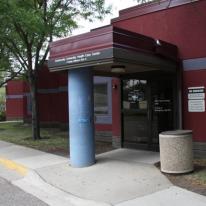As we have moved through the pandemic, we have seen many examples of how health (and health care) are impacted by public policy. In Minnesota, we have also seen that our policy makers have reached out to experts, many of them from this University, to gather the data that shapes that policy. In this case, it might be something as simple as whether or not wearing a mask indoors helps limit the spread of COVID-19.
Less visible, perhaps, are the daily political determinants of health. The Humphrey School of Public Affairs, led by Dean Laura Bloomberg, is ranked among the nation’s top 10 professional public policy schools and is a leader in assessing how policy and politics affect health outcomes.
As we navigate the changes to health systems brought about by the pandemic, as we continue to try to serve our community in the best way possible, we need to learn more about the larger forces that impact health. An excellent place to start would be attending the upcoming Quie & Peterson Global Health Lecture hosted by the Center for Global Health and Social Responsibility on Oct. 26, where esteemed panelists including Dean Bloomberg will be presenting: “Charting the Path to Health Equity: A 20/20 Review of the Political Determinants of Health.” They will highlight the ways in which political determinants of health have a far greater impact on our ability to achieve health equity than we may realize, and how the long-lasting impact of decisions made by our political leaders can influence the health of generations to come. This timely lecture offers information valuable to all of us.
If we understand how health care is impacted by public policy, it enables us to better strategize our own research and how to present our data and best practice models to the people who create that policy.
Please consider your role in bringing about change and working toward health equity. Understanding the interplay of our governmental leadership and our ability to provide care directly impacts the wellbeing of communities around the world.
Thank you,
Jakub Tolar, MD, PhD
Vice President for Clinical Affairs

Katy Kozhimannil and Daniel Weisdorf Honored with Prestigious Awards
The Heinz Family Foundation named health services researcher Katy B. Kozhimannil, PhD, MPA, the recipient of the prestigious 25th Heinz Award in the Public Policy category. Kozhimannil is currently OACA’s Director of Rural Health Programs, Director of CTSI’s Office of Rural Health, and a professor at the University of Minnesota School of Public Health. Daniel J. Weisdorf, MD, professor of Medicine and deputy director of the Clinical and Translational Institute, received the 2020 Charles Bolles Bolles-Rogers Award by the Twin Cities Medical Society Foundation (TCMSF). Weisdorf is considered a world expert on the topic of translational research on stem cell transplantation with a focus on graft versus host disease.

Community-University Health Care Center Recognized for Health Care Excellence
Community-University Health Care Center (CUHCC) received an “Excellence in Health Care” award from UCare for their quality care in prepaid medical assistance and MNCare. CUHCC was one of two Federally Qualified Health Centers to receive an award this year at UCare’s annual “A Salute to Excellence!” The event recognized 21 clinics and care systems in Minnesota for top results in the 2019 Healthcare Effectiveness Data and Information Set (HEDIS) measures — including preventive care, disease management, behavioral health, maternity care, care transitions and medication management.

Building Better Brains
The University has brought together a team of experts from neuroscience, pediatrics, psychology, psychiatry, education, and child development to form the Masonic Institute for the Developing Brain (MIDB), which focuses on diagnosing, treating, and preventing neurodevelopmental disorders in kids. The institute, named in recognition of a $35 million gift from Minnesota Masonic Charities, will be located at a former hospital facility along the Mississippi River near the U’s Twin Cities campus.

Ethics Grand Rounds: COVID-19 Response: Promoting Fairness and Equity
Ethics Grand Rounds: COVID-19 Response: Promoting Fairness and Equity Join the Center for Bioethics for their final Ethics Grand Rounds for Fall 2020 on Nov. 6. Ethical guidance for COVID-19 response in Minnesota calls for balancing three ethical objectives: protecting the population’s health by reducing mortality & serious morbidity; respecting the rights and interests of individuals & groups; and striving for fairness while protecting against systematic unfairness. Professors Susan Wolf and Debra DeBruin, co-leaders for the Minnesota COVID Ethics Collaborative, will discuss strategies to strike this balance, with a focus on protections for fairness and equity.

Boots on the Ground
The Twin Cities Recovery Project, Inc. in collaboration with the Medical Discovery Team on Addiction will host “Boots on the Ground,” on Dec. 4, a virtual conference on community-based programming to reduce stigma and racial disparities in access to opioid use disorder services. Speakers will share the stories of their programs, highlighting factors that both enable and challenge their program successes, including funding, partners, and evaluation. Facilitated panel and breakout sessions will provide for additional insights and synthesis.

Mothers Leading Science Program
Mothers Leading Science program is a career and professional development program from the Clinical and Translational Science Institute (CTSI) intended for research-intensive female faculty in the health sciences who are raising school-age and/or young children. The purpose is to foster professional and personal growth, provide peer mentoring, integrate the dual roles of scientist and mother, and build a network of peers for ongoing support throughout their careers. Application deadline is Oct. 28.

Feasibility Review Process Wins SOCRA Award
A University of Minnesota feasibility review support service recently received special recognition from the Society of Clinical Research Associates (SOCRA). This free service helps UMN researchers enhance their protocols and get studies started quickly



